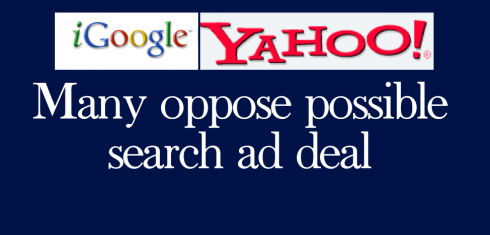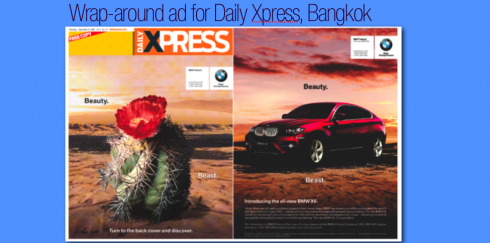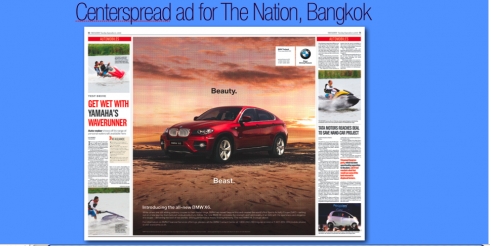


Used to be that one would see a wrap-around ad dominating the front and back of a newspaper once in a blue moon; nowadays, however, we see a worldwide trend for newspapers to embrace those ads that occupy the front page of the newspaper—-minus the logo and perhaps a promo line—-and extend all the way to the back. Maybe it is the difficult economic times we are in, or the desire of publishers to experiment, or greater willingness on the part of editors to accept giving up their front page to an advertiser client. From one end of the globe to the other, wrap-around ads are now a weekly occurrence, and I predict that we will see more of them in the future.
Today’s mail from Leroy Sylk, design editor of Bangkok’s Daily Xpress, brings us his newspaper’s use of the wrap-around ad for car manufacturer BMW. Here is Leroy’s note:
Just to say that BMW—on not one but two consecutive days—booked the cover and back cover of Xpress for an ad wrap. And on the first day they even booked a huge ad on The Nation centrespread featuring their same model!
The Google-Yahoo possible advertising deal
We posted an item in our blog yesterday about the rapid rise of text ads. Based on an article published by The Wall Street Journal, we mentioned that spending on Internet advertising is climbing at a healthy clip —rising 20% in the U.S, in the second quarter—and the forecasts are for further growth, despite the weak economy.
And , of course, the primary beneficiary of such trend is Google Inc. , which has made the simple text ads that appear to the right of the screen its main turf. Yahoo and Microsoft, on the other hand, have banked on the more sophisticated and graphically elaborate display ads, with which they had hoped to gain ground on Google. It Is not happening.
Now, Google and Yahoo have announced that they are contemplating a search advertising deal that would allow them to build an alliance. Not only are newspaper organizations opposing this possible deal, but Microsoft, too, is against it, on the grounds that this would create an unfavorable competitive environment, tilted to benefit Google.
Under the agreement between the search engine companies, Yahoo can run
advertisements supplied by Google alongside Yahoo¹s own search results. The
deal would provide millions of dollars in revenue to Yahoo and strengthen
Google¹s dominance over the search engine advertising market.
Speaking to a US Congressional committee, Brad Smith, Microsoft vice president and general counsel, said:
“Never before in the history of advertising has one company been in a position to control prices on up to 90% of advertising in a single medium,” Smith said, appearing before the Senate judiciary subcommittee on antitrust, competition policy and consumer rights.Not in television, not in radio, not in publishing. It should not happen on the internet” .
Today, WAN (World Association of Newspapers) issued a statement, opposing the deal as well:
World¹s Press Opposes Yahoo-Google Advertising Deal
The World Association of Newspapers today (15 September) asked competition
authorities in Europe and North America to block an advertising agreement
between Google and Yahoo on anti-competitive grounds, saying the deal would
have a negative impact on the advertising revenues that the search giants
provide to newspaper and other websites, and on the cost of paid search
advertising.
WAN, which represents 77 national newspaper associations and 18,000
newspapers world-wide, called on the Antitrust Division of the United States
Department of Justice, the European Commission¹s Competition Directorate,
and the Competition Bureau of Canada to examine the impact of the agreement
and to block the deal.
³WAN believes that the competition that currently exists between Google and
Yahoo is absolutely essential to ensuring that our member titles receive
competitive returns for online advertising on their sites, and for obtaining
competitive prices when they purchase paid search advertising,² said Gavin
O¹Reilly, President of the Paris-based WAN, in letters to the directors of
the three agencies.
³In our view, the proposed advertising deal between Google and Yahoo would
seriously weaken that competition, resulting in less revenues and higher
prices for our members. WAN is also concerned that this deal would give
Google unwarranted market power over important segments of online
advertising.
![]()
http://www.wan-press.org/article17866.html
http://www.guardian.co.uk/media/2008/jul/16/microsoft.googlethemedia